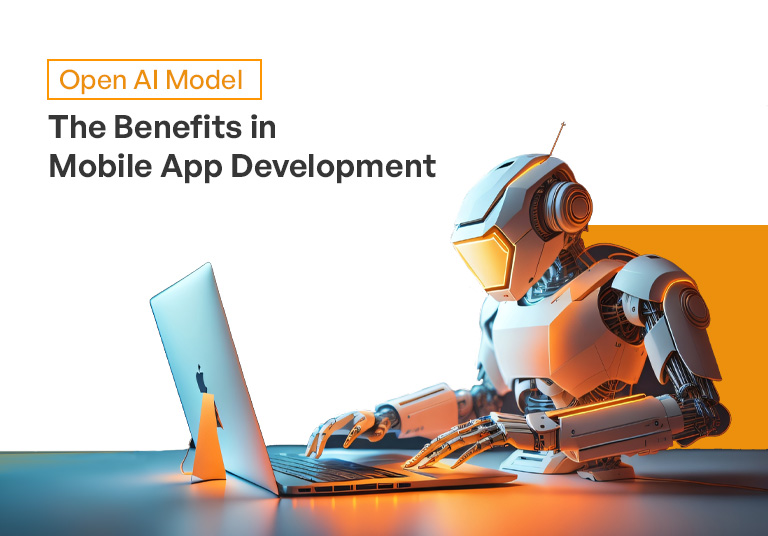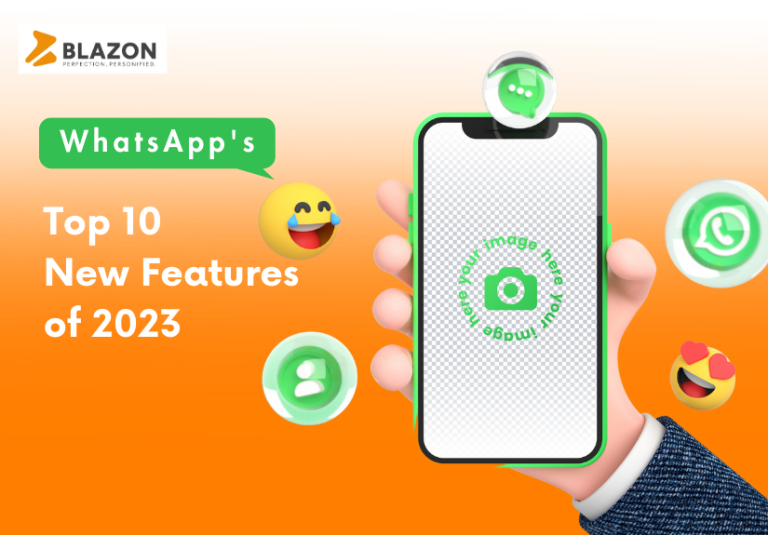Open AI Model: The Benefits in Mobile App Development

Artificial intelligence is now changing the entire digital industry. One remarkable component is OpenAI, whose technology has fundamentally transformed and shown to be revolutionary in mobile app development. The Open AI is not only revolutionising functionalities, but also causing a dynamic change in statistics and numbers. Source statistics reveal a considerable transition and look more promising in the approaching years.
An Overview of OpenAI
OpenAI is a prominent force behind DALL-E and ChatGPT, standing out as both a tech company and a research center specializing in artificial intelligence (AI) and machine learning (ML) technologies. The organization is actively shaping the future of the industry by offering tools that can be seamlessly integrated into apps, ensuring the widespread adoption of safe and responsible AI.
Continuing its mission, OpenAI is dedicated to advancing technologies for Natural Language Processing, robotics, and Machine Learning to tackle challenges and foster ethical solutions. Additionally, the company is actively engaged in enhancing generative models to reinforce deep learning.
OpenAI has already amassed an extensive array of intelligent tools, including DALL-E, ChatGPT-3, and ChatGPT-4. Furthermore, the organization has forged valuable partnerships with industry leaders like Microsoft to deliver cutting-edge AI solutions.
A statistical overview of OpenAI
- OpenAI’s revenue is projected to surge by $200 million by year-end and reach $1 billion in 2024.
- A majority of the traffic to OpenAI comes directly, constituting 85.65% of the total traffic share.
- OpenAI’s technologies are accessible in over 156 countries worldwide.
- In 2023, OpenAI recorded over 100 million active users.
Now, let’s delve into the broader perspective and explore the key aspects of utilizing OpenAI.
Why Do You Need Open AI In Mobile App Development?
Developers are harnessing OpenAI to create innovative solutions for apps. Here are some of the key benefits of using OpenAI in app development:
Understanding User Behavior
OpenAI excels in machine learning algorithms, enabling it to better understand users, their behavior patterns, and preferences. This deep understanding facilitates the analysis of user interactions with apps. By leveraging this capability, developers can craft highly customized solutions that enhance user engagement, retention, and sales.
Advanced Analysis
OpenAI possesses robust capabilities for capturing and analyzing sound and images. It can effectively analyze user behavior and user-generated content. This predictive analysis empowers developers to proactively respond to user actions, making apps more intuitive and conversational.
Visual and Voice Recognition
OpenAI boasts advanced features in speech and image recognition, allowing it to respond to both images and voice commands. With this functionality, users can operate apps using voice input instead of traditional text-based input methods.
How Does OpenAI Help in Mobile App Development?
Developing an app integrated with OpenAI proves highly effective for businesses and end-users. AI-driven app development facilitates the incorporation of OpenAI, offering numerous benefits to apps:
Better User Experience
OpenAI’s robust model contributes to creating innovative solutions, elevating the mobile experience with AI and ML. It simplifies personalization, catering to individual preferences.
Additionally, it empowers developers to build intelligent chatbots and virtual assistants, delivering exceptional mobile apps that foster increased customer engagement, retention, and improved results.
More Refined and Sorted Technology
Utilizing AI technology, especially with OpenAI, simplifies algorithm learning. OpenAI unlocks immense potential in app development, providing capabilities such as deep data analysis, personalized recommendations, and more.
It also simplifies language barriers, with robust chatbots capable of real-time language decoding, translation, and transcription, ultimately enhancing the user experience.
Increased Productivity and Less Errors
OpenAI promptly identifies and addresses errors, offering solutions when mistakes occur. OpenAI models, trained on diverse datasets, excel in spotting medical conditions and analyzing images, resulting in improved productivity and reduced errors.
Improved Efficiency and Data Analysis
OpenAI automates mundane tasks and streamlines app development, freeing up developers to focus on critical areas. It facilitates the analysis of extensive data, identifying trends, insights, and patterns, enabling well-informed decision-making.
Potential for Customization
When it comes to OpenAI, the mobile app development process offers numerous opportunities for customization. Seasoned app developers have a wide range of options to tailor functions and performance to specific requirements. The extent of customization increases as the program adjusts to user preferences and behavior. Developing a custom OpenAI app is an intriguing process.
Furthermore, developers have a strong capacity to adapt and seamlessly incorporate new updates without disrupting app functionality.
Powerful Mobile Safety
The OpenAI model has the potential to safeguard apps from malicious software and unauthorized users. Machine learning models can identify dangerous patterns in network traffic that hackers might exploit. OpenAI incorporates a range of features, including biometrics and encrypted data, enabling it to quickly detect data breaches, identify unwelcome intruders, and alert to unusual activities.
What are the Cons of Using OpenAI in Mobile App Development?
While OpenAI offers numerous benefits, there are also some drawbacks that may give businesses pause.
Quite Expensive
One significant drawback to using OpenAI is its cost. Integrating models, updating apps, and maintaining them with OpenAI can be expensive. The operational resources required to support OpenAI can be high, making it a potentially costly investment. This cost factor becomes even more challenging when implementing AI technology. However, if a business is willing to invest in the usage of OpenAI, including APIs and ongoing maintenance, this cost can be justified. So, cost is one of the drawbacks, but there are more to consider.
Integration Challenges
Another potential challenge is integration. If the device or platform being used has limitations, it may be difficult to seamlessly integrate OpenAI models into apps. Issues such as latency and responsiveness can also arise when calling these models from within apps. Additionally, OpenAI imposes licensing and agreement constraints that may limit the incorporation of its software. Overcoming these integration challenges requires effort and expertise to ensure that OpenAI functions efficiently within an app.
Data Dependency
OpenAI’s effectiveness relies on a substantial amount of training data, and this can be a limitation. The quality and quantity of data used can significantly impact OpenAI’s usability and service quality. Any issues with the data can affect an app’s performance. Moreover, the AI functionality necessitates continuous access to OpenAI’s infrastructure, which can limit offline functionality and impact overall app speed.
Privacy Concerns
Privacy and data security are notable concerns with OpenAI. As the model is trained on extensive datasets, issues related to privacy can arise. This includes concerns about sharing sensitive financial information and private data when using OpenAI’s API. If not managed properly, these concerns can lead to data breaches and compromise user privacy.
Important Models Of OpenAI For Mobile App Development
OpenAI boasts a variety of models that play a pivotal role in enhancing apps and elevating them to a higher standard. Among the notable and well-recognized examples are GPT-3, DALL-3, and CLIP. These are widely renowned OpenAI models that bring forth unique and advanced capabilities, catering effectively to the evolving market requirements.
Some other OpenAI models are,
Last Thoughts
As the world continues to watch the rapid progress of mobile app development, various hidden changes are visible. The worldwide community is quickly embracing these developments, putting them into action to reap a slew of benefits for both businesses and individuals. However, both the positive and negative features of OpenAI must be carefully considered. When we evaluate OpenAI from both sides, it is clear that it provides numerous benefits, including advanced technology, a smooth user experience, and empowered implementation.
In today’s rapidly evolving world, there is a growing anticipation for the availability of advanced infrastructure apps that come packed with futuristic features. For businesses, especially mobile app development companies in India, it is crucial to recognize the vast potential that comes with integrating OpenAI into their applications. Fortunately, various online platforms are now making it easier than ever for these businesses to seamlessly incorporate OpenAI models, allowing them to tap into the transformative power of artificial intelligence in their app development endeavors.
© 2023 Blazon All Rights Reserved.









 +91 97866 99000
+91 97866 99000 (720) 500-3435
(720) 500-3435 +4915168619030
+4915168619030





Leave a Reply
You must be logged in to post a comment.